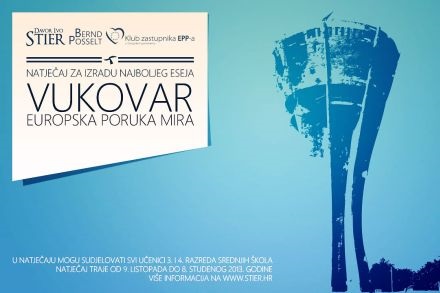
Strasbourg - An exhibition about the eastern Croatian city of Vukovar was staged in the European Parliament's building in Strasbourg on Monday on the occasion of Vukovar Remembrance Day observed on 18 November to commemorate the fall of the town in the hands of the occupying forces of local Serb rebels and the then Yugoslav People's Army (JNA) in the late autumn of 1991.
The exhibition of 15 photographs was formally opened by Croatian member of the European Parliament, Davor Stier of the HDZ, and German MEP Bernd Posselt of the CDU, both deputies of the European People's Party (EPP). The photos show the destruction of Vukovar landmarks and their reconstruction since the peaceful reintegration of eastern Croatia into Croatia's legal and constitutional system in 1998.
At the beginning of today's plenary session in Strasbourg, Stier also recalled what had happened in Vukovar 22 years ago. During the opening ceremony, Stier said "the message of this exhibition is peace and piety towards the heroic city of Vukovar." In Vukovar, Croatia defended itself against aggression. This was not a struggle between ethnic groups, nor was it a civil war. It was a struggle for the idea of freedom and against an ideology of destruction and dominance. This idea of freedom is the pillar of the Croatian state, the Croatian MEP said among other things.
Posselt said that the attack against Vukovar had been a systematic endeavour to destroy the European spirit. Vukovar was not a military fortification, it was not of strategic importance, it was a symbol of European culture. Vukovar was and is a city in which different peoples have lived for centuries, and the main reason was to destroy the spirit of Europe, the German MEP said. Posselt said that the then JNA and Slobodan Milosevic were driven by ideas of totalitarianism, Communism and nazi-socialism and ideas of nationalism in their attempt to conquer Vukovar. He said that therefore Vukovar Remembrance Day was not only important for Croatia but for Europe too. (Hina)